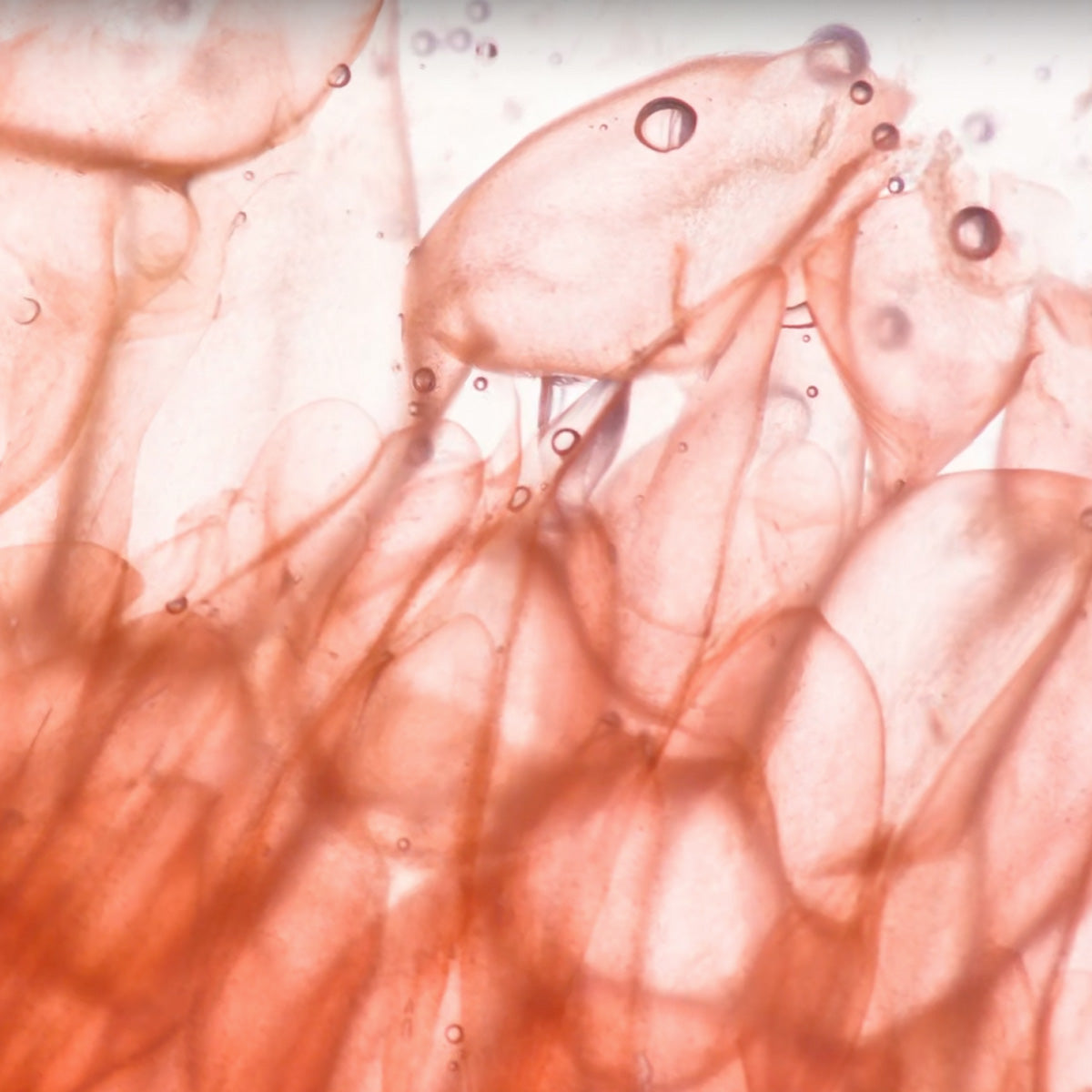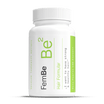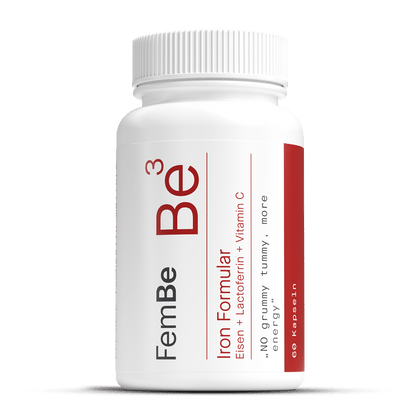

Have you ever heard of lactoferrin ? This fascinating protein is a true all-rounder, especially when it comes to iron levels and the immune system. Many people suffer from iron deficiency anemia and struggle with side effects from conventional iron supplements, such as abdominal pain or tooth discoloration.
Could lactoferrin offer a gentle and effective alternative? In this article, we explore what lactoferrin is, how it works, and why it's so promising.
The most important things in brief
Lactoferrin is a protein that not only binds iron but also has antimicrobial and anti-inflammatory properties.
It offers an effective and well-tolerated option for the treatment of iron deficiency anemia.
Lactoferrin is a safe and effective alternative to conventional iron supplements, especially for pregnant women .
How does lactoferrin work?
Lactoferrin has a positive effect on the body in several ways:
Iron binding and transport:
Through its ability to bind iron, lactoferrin prevents pathogens such as bacteria and viruses from using the iron they need for their growth.Antibacterial and antiviral properties:
Lactoferrin weakens the cell walls of bacteria and prevents their proliferation. Studies show that it also prevents viruses from infecting cells by blocking their binding to cell membranes [4,5,6].Anti-inflammatory:
Lactoferrin can reduce inflammation in the body. A study with young mice showed that lactoferrin was particularly effective in reducing intestinal inflammation . This property could also be important for people with inflammatory diseases [7].

Lactoferrin for iron deficiency anemia
Iron deficiency is one of the most common deficiencies worldwide and primarily affects women. Typical symptoms include:
- Tiredness and exhaustion
- Feeling weak
- Hair loss
To meet the daily iron requirement of approximately 1–3 mg, the body must absorb 10–15 mg of iron from food—a challenge because the bioavailability of iron from food is often low. [8,9]
Problems with conventional iron supplements
Many people turn to iron supplements to meet their iron needs. However, these often cause side effects such as diarrhea , nausea, or abdominal pain . Furthermore, the iron from these supplements is often not fully absorbed, which can cause a deficiency to persist despite consumption and can also promote inflammation in the intestines . [10,11,12,13]

Did you know?
Lactoferrin is not only found in the human body—for example, in tears , breast milk , and saliva . It is also extracted from cow's milk, making it a natural and sustainable resource.
How can lactoferrin help?
Lactoferrin offers a promising alternative here. It naturally promotes iron absorption while protecting the intestines from damage caused by excess iron. Studies have shown that lactoferrin can stabilize iron levels in the blood more effectively than conventional supplements while also reducing inflammation in the body .
Pregnant women , who often suffer from iron deficiency, particularly benefit from lactoferrin. A meta-analysis demonstrated that lactoferrin is not only safer but also more effective than conventional iron supplements. [14, 15]
Expert tip: This iron formula is convincing
Are you looking for an iron supplement without the typical side effects? After extensive research, we've found a formulation that specifically addresses these problems:
✓ Bioavailable iron bisglycinate
✓ 95% pure lactoferrin from Europe
✓ Natural vitamin C from rosehips
✓ No stomach upset or black stool
✓ Specially developed for women
Further positive effects of lactoferrin
Lactoferrin is not only a natural source of iron, but also supports the immune system:
-
Antimicrobial effect:
Iron deprivation and the weakening of cell walls disrupt the metabolism of bacteria and viruses, promoting the healing process in infections [5,6]. Inflammation reduction:
Especially in intestinal diseases, lactoferrin shows anti-inflammatory properties and supports the healing of the mucous membranes [7].

What is lactoferrin?
Lactoferrin is a protein from the transferrin group, which is responsible for transporting iron in the body. It occurs naturally in breast milk , tears , and saliva . Depending on the degree of iron saturation, a distinction is made between apo-lactoferrin (iron-free) and holo-lactoferrin (iron-saturated). Lactoferrin was originally associated with iron transport , but we now know that it has a variety of functions – from supporting the immune system to fighting pathogens [1,2,3].

When should you consider lactoferrin?
You should consider taking Lactoferrin if:
- conventional iron supplements cause you side effects such as nausea or abdominal pain,
- you suffer from recurring infections ,
- you suffer from inflammatory bowel disease ,
- you want to cover your iron needs gently during pregnancy .
Important : Always discuss taking it with your doctor. Even though lactoferrin is well tolerated, excess iron can be harmful.

Conclusion
Lactoferrin is a true all-rounder. It's far more than just an iron-binding protein and offers numerous health benefits: from iron absorption to anti-inflammatory and immune system support. For people who suffer from iron deficiency or have difficulty tolerating conventional iron supplements, lactoferrin represents an effective and gentle alternative.
Nevertheless, it is important to have your iron levels checked regularly to ensure that the therapy is optimally tailored to your needs.
Our expert
What is lactoferrin and what functions does it have?
Lactoferrin is a protein that binds and transports iron. It plays an important role in the immune system, has antimicrobial and anti-inflammatory effects, and also promotes iron absorption and supports the immune system.
Can lactoferrin help with iron deficiency?
Yes, lactoferrin can effectively help with iron deficiency. It improves iron absorption, stabilizes iron levels in the blood, and causes fewer side effects than conventional iron supplements.
What advantages does lactoferrin offer over conventional iron supplements?
Lactoferrin is well-tolerated and causes fewer side effects such as abdominal pain, nausea, or constipation. It also protects the intestines from damage that can be caused by excess iron.
Where does lactoferrin occur naturally?
Lactoferrin is found in breast milk, tears, and saliva. It is also extracted from cow's milk, making it a natural and sustainable resource.
Who is Lactoferrin particularly suitable for?
Lactoferrin is suitable for people with iron deficiency, pregnant women, people with sensitive stomachs or inflammatory bowel diseases, and anyone who wants to strengthen their immune system.
Are there any side effects when taking lactoferrin?
Lactoferrin is generally well tolerated. However, overdoses can lead to iron excess. It should be discussed with a doctor beforehand, especially during pregnancy.
References for further reading:
- Ward PP, Paz E, Conneely OM: Multifunctional roles of lactoferrin: a critical overview . In: Cell. Mol. Life Sci. Volume 62, No. 22, November 2005, pp. 2540–8, doi : 10.1007/s00018-005-5369-8 , PMID 162
- González-Chávez SA, Arévalo-Gallegos S, Rascón-Cruz Q. Lactoferrin: structure, function and applications. Int J Antimicrob Agents. 2009 Apr;33(4):301.e1-8. doi: 10.1016/j.ijantimicag.2008.07.020. Epub 2008 Oct 7. PMID: 18842395. 256 .
- Bokkhim H, Bansal N, Grøndahl L, Bhandari B. Physico-chemical properties of different forms of bovine lactoferrin. Food Chem. 2013 Dec 1;141(3):3007-13. doi: 10.1016/j.foodchem.2013.05.139. Epub 2013 Jun 7. PMID: 23871052.
- Ali AS, Hasan SS, Kow CS, Merchant HA. Lactoferrin reduces the risk of respiratory tract infections: A meta-analysis of randomized controlled trials. Clin Nutr ESPEN. 2021 Oct;45:26-32. doi: 10.1016/j.clnesp.2021.08.019. Epub 2021 Sep 3. PMID: 34620326.
- Ashraf MF, Zubair D, Bashir MN, Alagawany M, Ahmed S, Shah QA, Buzdar JA, Arain MA. Nutraceutical and Health-Promoting Potential of Lactoferrin, an Iron-Binding Protein in Human and Animal: Current Knowledge. Biol Trace Elem Res. 2023 Apr 14:1–17. doi: 10.1007/s12011-023-03658-4. Epub ahead of print. PMID: 37059920; PMCID: PMC10104436.
- Ellison RT 3rd, Giehl TJ, LaForce FM. Damage to the outer membrane of enteric gram-negative bacteria by lactoferrin and transferrin. Infect immune. 1988 Nov;56(11):2774-81. doi: 10.1128/iai.56.11.2774-2781.1988. PMID: 3169987; PMCID: PMC259649.
- Fan LL, Yao QQ, Wu HM, Wen F, Wang JQ, Li HY, Zheng N. Protective effects of recombinant lactoferrin with different iron saturations on enteritis injury in young mice. J Dairy Sci. 2022 Jun;105(6):4791-4803. doi: 10.3168/jds.2021-21428. Epub 2022 Apr 2. PMID: 35379462.
- Leipziger J. Absorption . In: Behrends J. , Bischofberger J. , Deutzmann R. , Ehmke H. , Frings S. , Grissmer S. , Hoth M. , Kurtz A. , Leipziger J. et al., eds. Duale Reihe Physiologie . 4th, unchanged edition. Stuttgart: Thieme; 2021.
- Gekle M. Iron absorption . In: Pape H. , Kurtz A. , Silbernagl S. , eds. Physiology . 9th, completely revised edition. Stuttgart: Thieme; 2019.
- Institute for Quality and Efficiency in Health Care: Iron deficiency and iron deficiency anemia https://www.gesundheitsinformation.de/eisenmangel-und-eisenmangel-anaemie.html (accessed on August 13, 2023)
- Nguyen M, Tadi P. Iron supplementation. [Updated 2023 Jul 3]. In: StatPearls [Internet]. Treasure Island (FL): StatPearls Publishing; 2023 Jan-. Available from: https://www.ncbi.nlm.nih.gov/books/NBK557376/
- Tiwari AK, Mahdi AA, Chandyan S, Zahra F, Godbole MM, Jaiswar SP, Srivastava VK, Negi MP. Oral iron supplementation leads to oxidative imbalance in anemic women: a prospective study. Clin Nutr. 2011 Apr;30(2):188-93. doi: 10.1016/j.clnu.2010.08.001. PMID: 20888091.
- Lund EK, Wharf SG, Fairweather-Tait SJ, Johnson IT. Oral ferrous sulfate supplements increase the free radical-generating capacity of feces from healthy volunteers. At J Clin Nutr. 1999 Feb;69(2):250-5. doi: 10.1093/ajcn/69.2.250. Erratum in: Am J Clin Nutr. 2003 Sep;78(3):498. PMID: 9989688.
- Zhao X, Zhang Nutrients. 2022 Jan 27;14(3):543. doi: 10.3390/nu14030543. PMID: 35276902; PMCID: PMC8838920.
- Abu Hashim H, Foda O, Ghayaty E. Lactoferrin or ferrous salts for iron deficiency anemia in pregnancy: A meta-analysis of randomized trials. Eur J Obstet Gynecol Reprod Biol. 2017 Dec;219:45-52. doi: 10.1016/j.ejogrb.2017.10.003. Epub 2017 Oct 4. PMID: 29059584.



![Zinc Capsules [Zinc Bisglycinate]](http://cellavent.de/cdn/shop/files/CH_essentials-zink-kapseln-Produktbilder_2025.png?v=1760952204&width=104)
















